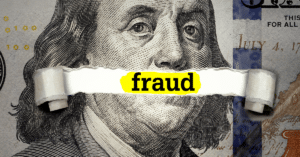Genetic testing, once heralded for its promise in healthcare innovation, is now confronted with a disconcerting reality – the rise of sponsored genetic testing fraud. But whistleblowers can play an active role in reporting this healthcare fraud scheme!
In this article, we’ll uncover the multifaceted nature of genetic testing fraud, equip you with tools to detect red flags, and explain the legal protections available for whistleblowers who take a stand against this illicit practice.
What is Sponsored Genetic Testing?
Sponsored genetic testing is a system in which pharma companies work with genetic testing labs to provide genetic tests that identify rare disease patients for particular drugs.
After patients take the tests, the genetic testing labs collect the data and use the insights to report back to the pharma companies who sponsored the tests. Pharma companies then use that information to help their sales reps know which doctor’s offices to target to try to sell specific drugs.
If a pharma company is successful in getting a physician to prescribe one of its drugs to a patient who has a rare genetic disease, the pharma company reaps tremendous rewards from the process. Not only do they benefit from the initial sale, but they also secure years of future sales because many of the drugs prescribed to treat these conditions are life-long commitments.
When is Sponsored Genetic Testing Considered Fraud?
Sponsored genetic testing fraud is a form of pharma fraud. The fraud occurs when the genetic testing lab shares identifying physician or patient data with the pharma company that provides this sponsored testing program.
The pharma companies then use this ill-gotten information to aggressively market their obscenely expensive drugs to those identified physicians in the hopes that they will prescribe the drugs to their patients who were identified as having a rare genetic disease.
Because pharma companies are using the information obtained from sponsored genetic tests to increase their own sales, it is considered an illegal kickback under the Federal False Claims Act. On April 2022, the Office of Inspector General (OIG) issued an Advisory Opinion about sponsored genetic testing.
Not only does this fraud scheme violate aspects of the legal system, but it also raises ethical concerns because it undermines the doctor-patient relationship. Pharma companies should not have a say in how a physician should treat any given patient, which is what they are attempting to do with the information they illegally obtain from the genetic testing labs.
Not to mention, using confidential patient data to sell a high-priced drug the patient may not need is an unjust use of patient information that can lead to widespread distrust of the healthcare industry.
Understanding the motives behind genetic testing fraud, such as financial gain, is critical to combat this illegal practice. Let’s take a look at some common red flags that may indicate sponsored genetic testing fraud is occurring in your workplace.
Detecting Red Flags
To empower healthcare professionals to identify potential sponsored genetic testing fraud, recognizing red flags is crucial. Here are three key indicators that might signal fraudulent activities within your workplace:
- Unjustified Volume: A sudden surge in the number of genetic tests being taken or processed without clear medical necessity.
- Document Sharing: Any paperwork shared between genetic testing labs and pharma companies that refers to confidential patient or physician data.
- Cozy Relationships: Unusual relationships between marketers, pharma companies, drug reps, doctors, and genetic testing labs that may suggest kickback arrangements.
Whistleblower Protections: Know Your Rights
Whistleblowers play a pivotal role in combating sponsored genetic testing fraud. Understanding the legal protections available is paramount.
If a whistleblower’s lawsuit is successful, the reward can be up to 30% of the funds recovered. The False Claims Act also offers whistleblowers protection in the workplace.
Whistleblower protections not only safeguard individuals who come forward but also act as a deterrent against fraudulent practices. We encourage potential whistleblowers to speak out, contributing to the eradication of genetic testing fraud.
Take the Next Step to Safeguard The Healthcare System
Sponsored genetic testing fraud poses a significant threat to the integrity of healthcare. Whistleblowers, armed with knowledge and legal protections, can be instrumental in exposing and preventing such fraudulent practices. Your courage and vigilance are essential for upholding ethical standards and ensuring the trustworthiness of genetic testing.
If you suspect pharma fraud in your organization, please contact us. DJO is comprised of a highly experienced team of whistleblower experts, lawyers, and even former whistleblowers, who strive to deliver the highest monetary reward for brave individuals who have valuable information that can expose fraud.

authored by Christopher J. Piacentile
Director of Investigations DJO Whistleblower Law Group


